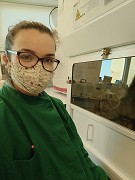

|
Thu24 Mar12:20pm(10 mins)
|
Where:
P/X001
Session:
Speaker:
|

P. falciparum rosetting, the binding of two or more uninfected erythrocytes to an infected erythrocyte, is a key virulence factor associated with severe malaria. Rosette formation is mediated by P. falciparum erythrocyte membrane protein 1 (PfEMP1) expressed on the surface of infected erythrocytes. Several molecules have been proposed as host rosetting receptors (such as Blood Group A antigen and Complement Receptor 1), but none of these can account for rosetting interactions across all parasite strains, suggesting that major host receptors remain unidentified. The Wrightb blood group antigen, which is formed by a physical interaction between Band 3 and Glycophorin A, has been identified by the Rowe lab as a potential novel rosetting receptor. Antibody fragments targeting Wrightb, disrupt rosettes in several P. falciparum strains, but the mechanism of action of this antibody is largely unknown. This study aimed to characterise this key receptor-ligand interaction implicated in rosetting and determine if a rosette-disrupting antibody to Wrightb is active against a range of P. falciparum strains, suggesting therapeutic potential.
To determine whether the Wrightb antigen or Band 3 is a rosetting receptor, we tested the ability of Band 3-transfected K562 cells and naturally occurring Glycophorin null cells to form rosettes with purified P. falciparum-infected erythrocytes. Our results showed that Band 3-transfected cells (expressing the Wrightb antigen) form rosettes with two parasite strains, whereas wild type K562 cells (expressing Glycophorin A alone) do not. Rosette frequency and rosette size did not vary across the glycophorin genotypes examined, showing that Glycophorin A is not essential for rosetting for the parasite strains tested. Further, we revealed that anti-Wrightb antibody fragments show variable activity against a panel of rosetting culture-adapted P. falciparum strains and clinical isolates. Thus, our data suggest that Wrightb could be a potential anti-rosetting therapeutic target, but that, due to the complexity of rosetting mechanisms, multiple host receptors may need to be targeted to obtain an intervention effective against all P. falciparum strains.